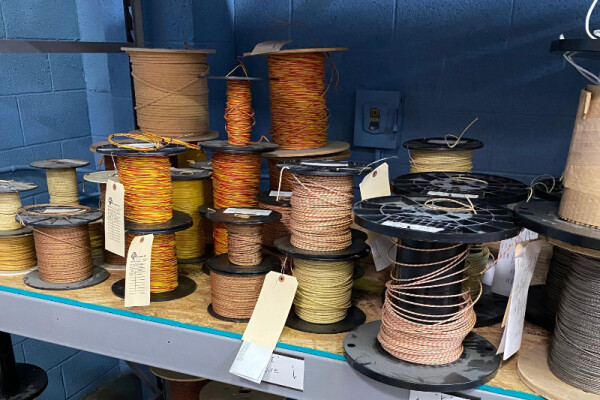Toll Free: (800) 888-8987 | Phone: (440) 835-3540 | office@ramsensors.com
Thermocouple Wire
RAM Sensors provides high quality thermocouple wire for all of your specific temperature sensing needs. Thermocouple wire can be used to construct a wide array of thermocouples, depending on the type of metal used at the point of sensing on the cold junction compensation (CJC) end. We stock a variety of wire types and have them ready for immediate shipping. Your satisfaction is our goal – reach out for help to find the best thermocouple wire for your project.
Various types of thermocouple wires are color coded for easy identification, and your RAM Sensors representative can give you specifics. Listed below are the various types along with the individual specifications:
Type J: Iron – Constantan; -210°C / -346°F to 1200°C / 2193°F; Reducing, vacuum, Inert. Limited use in oxidizing at high temperatures. Not recommended for low temperatures
Type K: Chromel – Alumel; -270°C / -454°F to 1372°C / 2501°F; Clean oxidizing and inert. Limited use in vacuum or reducing. Wide temperature range, most popular calibration.
Type T: Copper – Constantan; -270°C / -454°F to 400°C / 752°F; Mild oxidizing, reducing vacuum or inert. Good where moisture is present. Low temperature & cryogenic applications
Type E: Chromel – Constantan; -270°C / -454°F to 1000°C / 1832°F; Oxidizing or inert. Limited use in vacuum or reducing. Highest EMF change per degree.
Type N: Nicrosil – Nisil; -270°C / -450°F to 1300°C / 2372°F; Alternative to Type K. More stable at high temps.
Type R: Copper – Alloy 11; -50°C / -58°F to 1768°C / 3214°F; Oxidizing or inert. Do not insert in metal tubes. Beware of contamination. High temperature.
Type S: Copper – Alloy 11; -50°C / -58°F to 1768°C / 3214°F; Oxidizing or inert. Do not insert in metal tubes. Beware of contamination. High temperature.
Type B: Platinum- 30% / Rhodium PT- 30% – Platinum- 6% / Rhodium Pt- 6%; 0°C / 32°F to 1820°C / 3308°F; Oxidizing or inert. Do not insert in metal tubes. Beware of contamination. High temperature common use in glass industry
All wires meet stringent purity and quality standards. Several factors, such as electromagnetic interference, total loop resistance, and electrical noise will affect the ideal length of thermocouple wire used in each application. Resistance will generally vary based on the wire material as well as diameter and length. In general, we offer spools of 50, 100, 200, 500, and 1,000 feet. We also have special construction thermocouple wire – such as multi-pair thermocouple extension wire – available. The three main forms of thermocouple wire are listed below:
Bare Thermocouple Wire: wire without insulation – typically sold on a spool, ordered as a pair, and useful for small Thermocouples in special applications
Duplex Insulated Thermocouple Wire: most common type – High Temp Glass, Glass, PFA and Glass, Neoflon PFA, Neoflon FEP, Polyvinyl, Polyvinyl Rip Cord, Ceramic, and Silica are available jacketing options
Metal Sheathed Thermocouple Wire: wires are surrounded by insulation and armored using a metal sheath – this type of wire can withstand vibration, high temperatures and extreme pressure
You Can Trust RAM
We stock the wire and cable that can help you to complete your thermocouple installation or repair, and provide materials that are manufactured to deliver reliable performance, no matter the environment. If you have any questions about which type of thermocouple wire would best fit your current system, please contact us. We are happy to help you find the ideal solution for your temperature sensing needs.





